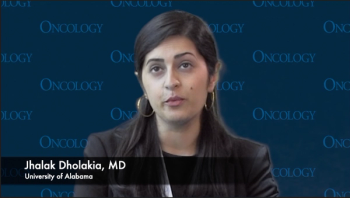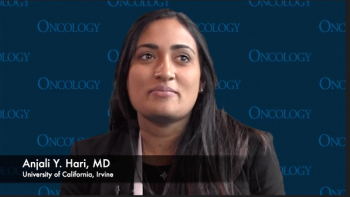
Ovarian Cancer
Latest News


Bevacizumab Plus First-Line Chemotherapy Leads to Better Survival in Advanced Ovarian Clear Cell Carcinoma
Latest Videos

CME Content
More News

Results from the phase 3 SORAYA trial supported the acceptance of a biologics license application for mirvetuximab soravtansine under priority review by the FDA for patients with folate receptor α–high platinum-resistant ovarian cancer.

Real-world practice patterns with bevacizumab for patients with ovarian cancer differed greatly from published clinical trial data.

Minimal increases in genetic testing and counseling were observed when using a traceback program to contact patients with ovarian cancer and surrogates via phone, and was not time sensitive.

At SGO 2022, Catherine Watson, MD, spoke about how to encourage patients with ovarian cancer to seek genetic testing.

An ongoing trial assessing neoadjuvant mirvetuximab soravtansine plus carboplatin in advanced folate receptor α–positive ovarian was reviewed by Jhalak Dholakia, MD, at The Society of Gynecologic Oncology 2022 Annual Meeting on Women’s Cancer.

Ira Winer, MD, PhD, FACOG, spoke about future directions of nemvaleukin alfa plus pembrolizumab for patients with pretreated platinum resistant ovarian cancer.

At SGO 2022, Catherine Watson, MD, spoke about the 2 arms of a randomized education trial presented at the conference.

Patients with platinum-resistant ovarian cancer may benefit from treatment with ofranergene obadenovec, which received fast track designation from the FDA.

Ursula A. Matulonis, MD, speaks to potential future uses of mirvetuximab soravtansine in ovarian cancer.

In an interview with CancerNetwork®, Ursula A. Matulonis, MD, discusses the toxicities associated with mirvetuximab soravtansine in folate receptor α–high platinum-resistant ovarian cancer.

At SGO 2022, Catherine Watson, MD, spoke about how to improve genetic education for patients with ovarian cancer.

Ira Winer, MD, PhD, FACOG, spoke about high response rates observed in patients with pretreated platinum-resistant ovarian cancer from the phase 1/2 ARTISTRY-1 trial.

Data from the phase 2 KGOG 3046 trial revealed evidence of antitumor activity with the neoadjuvant chemoimmunotherapy regimen containing durvalumab and tremelimumab for patients with advanced-stage ovarian cancer.

Ursula A. Matulonis, MD, discusses key data with mirvetuximab soravtansine for patients with folate receptor α–high platinum-resistant ovarian cancer that read out of the phase 3 SORAYA trial.

Anjali Y. Hari, MD, speaks to the rationale for examining hyperthermic intraperitoneal chemotherapy in a population of frail and non-frail patients with ovarian cancer.

In a discussion with CancerNetwork®, Ursula A. Matulonis, MD, describes the potential of mirvetuximab soravtansine (IMGN853) as a treatment for patients with folate receptor α (FRα)–high platinum-resistant ovarian cancer.

Ira Winer, MD, PhD, FACOG, spoke about patients with pretreated platinum-resistant ovarian cancer treated with nemvaleukin alfa plus pembrolizumab in the phase 1/2 ARTISTRY-1 trial.

In an interview with CancerNetwork®, Melissa Hardesty, MD, discusses how maintenance niraparib and bevacizumab following frontline platinum-based chemotherapy and bevacizumab yielded promising results in patients with advanced ovarian cancer.

Anjali Hari, MD, Speaks to Survival/Safety Outcomes With HIPEC in Frail and Non-Frail Ovarian Cancer
Anjali Hari, MD, discusses survival and safety outcomes with hyperthermic intraperitoneal chemotherapy in frail and non-frail patients with ovarian cancer.

Ursula A. Matulonis, MD, highlights the rationale behind studying mirvetuximab soravtansine (IMGN853) as a therapy for patients with folate receptor α (FRα)–high platinum-resistant ovarian cancer.

The addition of relacorilant to nab-paclitaxel has improved overall survival in patients with recurrent, platinum-resistant ovarian cancer.

A significant improvement in progression-free survival was observed in the phase 3 ATHENA-MONO trial with first-line maintenance rucaparib vs placebo in patients with advanced ovarian cancer.

Ira Winer, MD, PhD, FACOG, spoke about which presentations during The Society of Gynecologic Oncology 2022 Annual Meeting he most enjoyed.

A biologics license application for mirvetuximab soravtansine, which demonstrated a clinically meaningful objective response rate, was submitted to the FDA for folate receptor α-high platinum-resistant ovarian cancer that has previously been treated with 1 to 3 lines of systemic treatments.

The phase 3 PRIME study showed increased progression-free survival for patients with newly diagnosed ovarian cancer who were treated with an individualized starting dose of maintenance niraparib vs placebo.











































